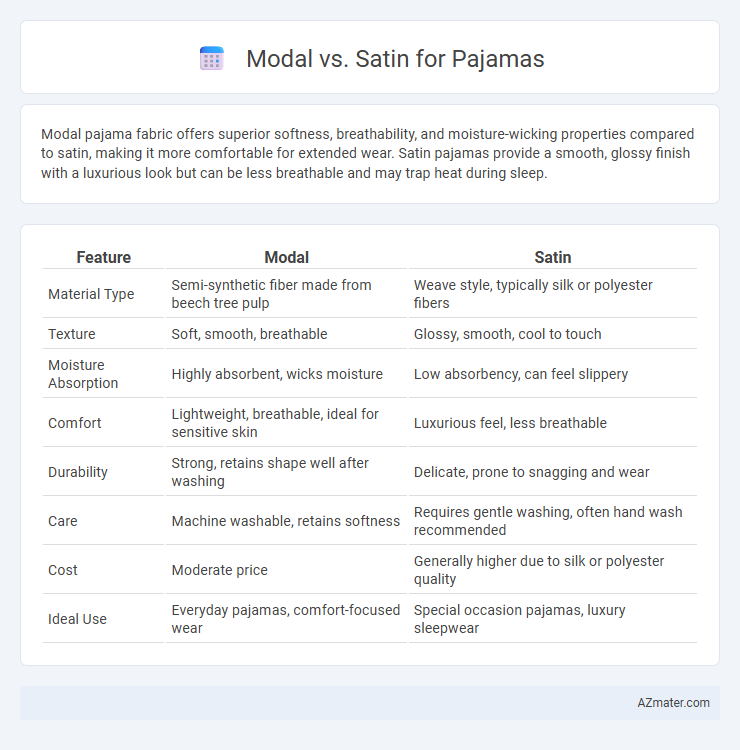Modal pajama fabric offers superior softness, breathability, and moisture-wicking properties compared to satin, making it more comfortable for extended wear. Satin pajamas provide a smooth, glossy finish with a luxurious look but can be less breathable and may trap heat during sleep.
Table of Comparison
| Feature | Modal | Satin |
|---|---|---|
| Material Type | Semi-synthetic fiber made from beech tree pulp | Weave style, typically silk or polyester fibers |
| Texture | Soft, smooth, breathable | Glossy, smooth, cool to touch |
| Moisture Absorption | Highly absorbent, wicks moisture | Low absorbency, can feel slippery |
| Comfort | Lightweight, breathable, ideal for sensitive skin | Luxurious feel, less breathable |
| Durability | Strong, retains shape well after washing | Delicate, prone to snagging and wear |
| Care | Machine washable, retains softness | Requires gentle washing, often hand wash recommended |
| Cost | Moderate price | Generally higher due to silk or polyester quality |
| Ideal Use | Everyday pajamas, comfort-focused wear | Special occasion pajamas, luxury sleepwear |
Understanding Modal and Satin Fabrics
Modal fabric, derived from beech tree pulp, offers exceptional softness, breathability, and moisture-wicking properties, making it ideal for comfortable pajamas. Satin, distinguished by its glossy surface and smooth texture, is typically made from silk, polyester, or nylon, providing a luxurious feel but less breathability than modal. Choosing between modal and satin pajamas depends on preferences for softness, temperature regulation, and aesthetic appeal.
Key Differences Between Modal and Satin
Modal pajamas are made from semi-synthetic fibers derived from beech tree pulp, offering breathability, softness, and excellent moisture-wicking properties, making them ideal for warm climates or sensitive skin. Satin pajamas, typically crafted from silk or polyester, provide a smooth, glossy finish with a luxurious feel but can trap heat and lack breathability compared to modal. Key differences include modal's superior moisture management and durability versus satin's aesthetic appeal and sleek texture.
Comfort Comparison: Modal vs Satin Pajamas
Modal pajamas offer superior breathability and moisture-wicking properties, making them exceptionally comfortable for all-night wear, especially in warmer climates. Satin pajamas, made from smooth synthetic fibers or silk, provide a luxurious, soft texture but can retain heat and may feel less breathable. For optimal comfort, modal pajamas excel in temperature regulation, while satin pajamas prioritize a sleek, slippery feel against the skin.
Breathability and Moisture-Wicking Properties
Modal pajamas offer superior breathability and excellent moisture-wicking properties due to the fabric's natural cellulose fibers, allowing for effective airflow and quick drying. Satin pajamas, typically made from synthetic fibers or silk, provide a smooth and luxurious feel but generally lack the breathability and moisture absorption found in modal. For those prioritizing comfort in warm or humid conditions, modal pajamas are more effective at keeping the skin dry and cool.
Durability and Longevity of Pajamas
Modal pajamas offer superior durability due to their high resistance to shrinkage and pilling, making them ideal for long-term use. Satin pajamas, while luxurious and smooth, tend to be more delicate and prone to snags and wear over time. Choosing modal ensures extended longevity of pajamas, maintaining softness and shape after multiple washes.
Appearance and Texture: Which Feels Better?
Modal pajamas feature a smooth, silky texture with a subtle sheen that enhances their luxurious appearance, making them look elegant and soft to the touch. Satin pajamas have a glossy, lustrous finish that creates a shiny and glamorous look, often associated with a more formal or sensual style. In terms of feel, modal fabric offers a breathable, lightweight softness that feels comfortable against the skin, while satin provides a cool, slick surface with a delicate smoothness that some find soothing but others may consider less breathable.
Care and Maintenance Requirements
Modal pajamas demand gentle washing in cold water and air drying to maintain their softness and prevent shrinking, while satin pajamas require delicate hand washing or low-temperature machine cycles to avoid fabric damage and preserve their glossy finish. Both fabrics benefit from avoiding bleach and harsh detergents, but satin is more prone to snagging and should be ironed on a low setting or steamed to remove wrinkles safely. Proper care extends the lifespan of Modal and satin pajamas, ensuring comfort and appearance stay intact over time.
Price Point: Modal vs Satin Pajama Cost
Modal pajamas typically cost more than satin ones due to the natural fibers and eco-friendly production process involved in modal fabric, which ensures softness and breathability. Satin pajamas, often made from polyester or silk blends, offer a more affordable price point but may lack the moisture-wicking properties found in modal. Consumers seeking a balance between cost and comfort might find satin a budget-friendly choice, while modal pajamas represent a premium investment in durability and skin-friendly qualities.
Best Occasions to Wear Modal or Satin Pajamas
Modal pajamas are ideal for everyday wear due to their breathable, moisture-wicking properties, making them perfect for warm nights and lounging at home. Satin pajamas excel in special occasions or nighttime events, offering a luxurious, smooth texture that enhances comfort and elegance. Choose modal for casual comfort and satin for stylish, upscale relaxation.
Final Verdict: Which Pajama Material Should You Choose?
Modal pajamas offer superior softness and moisture-wicking properties, making them ideal for those seeking comfort and breathability during the night. Satin pajamas provide a luxurious feel and glossy appearance but tend to be less breathable and can cause heat retention. For optimal sleep comfort and durability, modal is generally the preferred choice over satin.

Infographic: Modal vs Satin for Pajama
 azmater.com
azmater.com